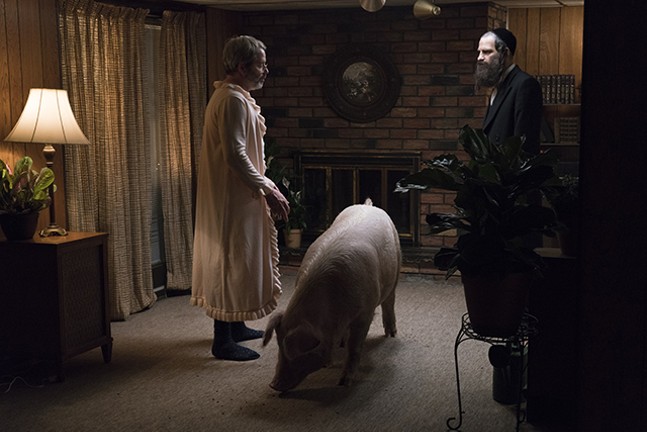Nobody actually knows what happens to us when we die, spiritually. And aside from morticians, most people don’t know what happens to our bodies, physically, when we die either. The science of decomposition is especially a mystery to Shmuel, a Hasidic Jewish man mourning the death of his wife in To Dust, a drama about unmanageable grief. Directed by Shawn Snyder, the film follows Shmuel as he attempts to understand what is happening to his wife’s body in the ground, with help from an aloof biology professor.
Shmuel (Géza Röhrig) can’t stop dreaming about his wife’s toe rotting underground. He’s plagued by visions of her body decaying for weeks and months after her death. He fears that, until her body is fully returned to the earth, her soul is suffering. His mother begs him to pull it together. His rabbi tries to talk him through the grief, but it’s not enough. His kids, seeing the hollow shell of their father, become convinced he’s possessed by a dybbuk (a Jewish demon). Not satisfied with the spiritual explanation, Shmuel seeks a scientific one from community college biology professor Albert (Matthew Broderick). After initially trying to brush off Shmuel and his unending questions, Albert reluctantly assists in the journey, which includes burying a dead pig two different times.
In some ways, To Dust is a classic buddy film pairing—one straight-laced character and one more chill (Albert smokes weed once). But it’s not exactly overplayed to see a biology professor and a Hasidic cantor paired together. There is so much focus on their personality differences that you forget one of the key reasons for conflict is that highly devout people Shmuel don’t learn about science in the same way as everyone else because it directly conflicts with religious teachings. He is focused on the Old Testament quote from which the movie’s title is drawn: “Then the dust will return to the earth as it was, and the spirit will return unto God who gave it.” Shmuel is shocked when he digs up a grave and sees that the body has not actually turned to dust.
The movie works best when it zooms in on the details of grief, like Shmuel’s sons whispering into his foot for the dybbuk to leave him alone, or Albert yelling “Killing a pig won’t bring your wife back!” The movie is at its worst when trying to forge some meaning out of Shmuel and Albert’s relationship, which never deepens, despite a 750-mile road trip to a body farm. While Shmuel shares intimate details about his feelings, the audience learns nothing about Albert, his personal life, or why he would be inclined to go on such a journey with a stranger.
Although Shmuel evolves, it remains unclear why his grief has manifested in such a way that even the rabbi can’t understand. A few of his characteristics sometimes feel like a caricature, like when he needs an empty jar to collect soil from his wife’s grave and empties an unopened jar of gefilte fish into the toilet. Surely, there must have been an easier way to obtain a vessel.
To Dust doesn’t work much of the time. It's occasionally slow, clunky, and tonally confusing. But even at its weaker points, the film still tackles its subject with heart. Shmuel’s grief is palpable, and his questions about death are universal. How do you move on with your life when the person you love is being devoured by maggots before turning into soil? The answer isn’t simple and looks different for everyone. There’s no wrong way to mourn — even grave-digging can be cathartic.















